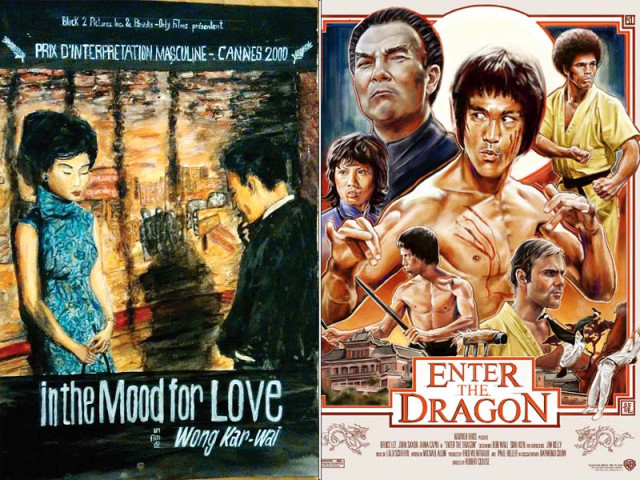Re-enter the dragon: Hong Kong’s new wave of films
City’s film-makers juggle between Chinese funding, freedom of expression and creative control

Enter the Dragon and In the Mood for Love are considered as Hong Kong’s most-loved classics. PHOTOS: FILE
Hong Kong once pumped out about 200 films a year, from Bruce Lee’s Enter the Dragon (1973) to Wong Kar-wai’s In the Mood for Love (2000). But in the past decade, the industry has slumped and just a few dozens are now produced annually.
One major factor is the booming Chinese movie sector, offering both experienced directors and recent graduates more money and opportunities. Yet, the pendulum now seems to be swinging back, as the desire for freedom of expression outweighs mainland mega-bucks.
“With new films, everyone asks, ‘Could it be released in China? Can you cooperate with the Chinese side?’ That’s how (investors) earn back their money,” says Hong Kong director Derek Chiu, 54, who has a string of local feature films under his belt.
Chiu says he struggled to find backers for his forthcoming drama Chung Ying Street, which focuses on riots against British rule. According to him, Hong Kong and mainland bodies have rejected his funding applications. A private backer has also pulled out over concerns his investment could impact business interests in China. “Maybe if I do Chung Ying Street, I cannot work in China but I will not give up. I need some creative control and freedom and China cannot provide that.”
Some Hong Kong directors have turned to crowd-funding to raise cash but maintain their independence. Celebrated cinematographer and Hong Kong resident Christopher Doyle used the Kickstarter platform for a recent, politically-sensitive project, raising more than $100,000. Hong Kong Trilogy: Preschooled, Preoccupied, Preposterous released last year, based on interviews with three generations of Hongkongers. One section is dedicated to mass pro-democracy protests that brought parts of the city to a standstill in 2014. “You can only say certain things in China so you’re making period dramas and you’re making action films, as opposed to more socially relevant films,” Doyle says. “Here, we have to do the opposite. We have a smaller budget. We have to be more concerned with the very few freedoms we still have.”
Doyle says the shift from securing mainland funding to prioritising freedom of expression has happened very quickly. The critical and commercial success of 2015’s 10 Years – a series of shots painting a grim picture of Hong Kong life in 2025 – is testament to the change. “I think, because of the social and political situation in Hong Kong, directors are more concerned with local topics,” says co-producer Andrew Choi.
But despite the new energy, some say the city’s cinematic glory will be hard to recapture in the face of an ascendant China and growing global competition.
“When big names were discovered in the 1980s, the market and the world were less crowded,” says Nansun Shi, a veteran producer who oversaw the 2002 hit Infernal Affairs. She adds that many film-makers will still be drawn to mainland or Chinese co-funded productions for the bigger budgets and greater exposure. “I think it’s just a natural progression that some more experienced directors have gone to China,” she says.
Still, next-generation film-makers say that keeping a local focus not only symbolises freedom but a better way to engage audience. “I’d rather work with limited resources on something I know about,” says recent graduate Crosby Yip, 24, who is making a privately-funded rom-com Diary of First Love. “If I make films about the place I grew up in, I think the feeling will be more solid and realistic. This is why I insist on working with Hong Kong themes.”
Published in The Express Tribune, July 12th, 2016.
Like Life & Style on Facebook, follow @ETLifeandStyle on Twitter for the latest in fashion, gossip and entertainment.



















COMMENTS
Comments are moderated and generally will be posted if they are on-topic and not abusive.
For more information, please see our Comments FAQ